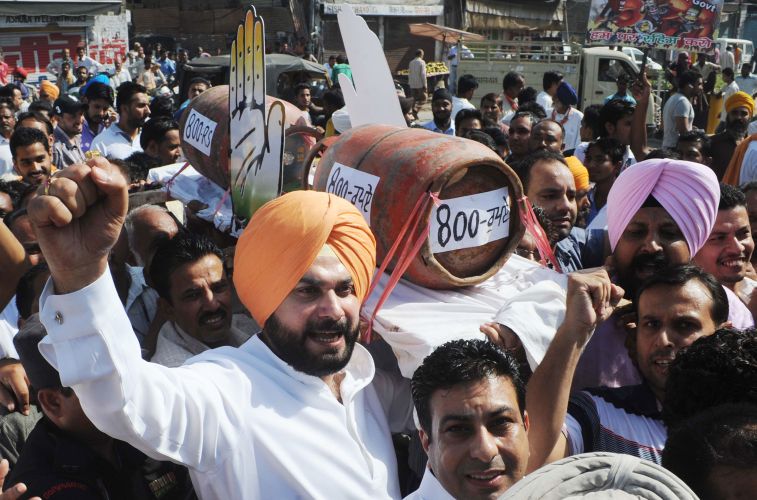India in day-long strike over supermarket reforms


Indian opposition parties and trade unions are staging a day-long strike over plans to open the country's retail sector to global supermarket chains
Indian opposition parties and trade unions are staging a day-long strike over plans to open the country’s retail sector to global supermarket chains.
Calcutta and Bangalore were virtually shut down, but the response in other parts of the country was mixed.
The reforms, which ministers say are needed to revive the economy, were formally introduced on Thursday.
But small shops fear they will be put out of business and many people are angry at recent fuel price rises.
Earlier in the week a key ally left the ruling coalition in protest, although its majority in parliament is not at immediate risk.
The Congress-led government attempted to introduce the retail reforms last year, but backed down in the face of opposition.


Thursday’s nationwide strike, called by the main opposition Bharatiya Janata Party (BJP), its allies and Communist parties, has shut down schools, businesses and public transport in many cities.
TV channels showed protests taking place in the cities of Patna, Allahabad and Varanasi in northern India.
Most businesses were shut in the eastern city of Calcutta and public transport was disrupted, reports said, with workers also blocking railways in Uttar Pradesh and Bihar states.
The southern state of Karnataka, which is governed by the BJP, was shut down in response to the strike call, with buses off the roads and schools, hotels and businesses closed. The state capital, Bangalore – home to hundreds of IT companies including multinationals like IBM and Microsoft – was completely shut down.
“We have asked our employees to stay back at home. We will instead work on Saturday,” an official of Infosys, one of India’s leading software companies, said.
“The fear factor is the reason for the closure,” a spokesperson for another multinational company said.
Much of the capital was operating normally on Thursday. There was a similar picture in the financial capital, Mumbai.
This may well signal that politically-led mass protests over a single issue no longer have the ability to shut down the entire nation.
It could also reflect the fact that the merits and demerits of such retail reforms are distant from ordinary members of the public.
The government’s plan is aimed at reviving a flagging economy, as well as avoiding the threat of a downgrade in India’s credit rating.
But many small shops fear for the future. Delhi-based trader, Deepak Sethi, said shopkeepers would lose business if foreign supermarkets were allowed into India.
“Multinational companies will destroy the economic and social fabric of the country and will adversely impact traders, transporters, farmers and other sections of retail trade,” Praveen Khandelwal, the head of the group, was quoted as saying by AFP news agency.
“These big companies can attract customers by selling at cost prices. That means people here are going to lose jobs. Shops like ours will be hit the most.”
The Trinamool Congress party, a key ally of the ruling coalition, has said it will pull out of the government and withdraw support in parliament. Its six ministers are to resign on Friday.
The government also announced a 14% rise in the price of diesel, which is heavily subsidized in India. That move has also prompted great anger across the country.
Under the government’s proposal, global firms – such as Walmart and Tesco – will be able to buy up to a 51% stake in multi-brand retailers in India.
Multinational retailers already have outlets in India, but at present they can sell only to smaller retailers. This decision allows them to sell directly to Indian consumers.
Indian Prime Minister Manmohan Singh has said the reforms would “help strengthen our growth process and generate employment in these difficult times”.
Recent Posts
Happy New Year 2025: Sydney Welcomes New Year with Fireworks Display
Sydney has welcomed 2025 with a spectacular fireworks display - cheers erupted as the clock struck midnight…
Brad Pitt and Angelina Jolie Reach Divorce Settlement After 8 Years
Following an eight-year legal battle, Angelina Jolie and Brad Pitt have reached a divorce settlement,…
Former US President Jimmy Carter Dies at 100
Former President Jimmy Carter died on December 29 at the age of 100 after spending several…
Georgia: Outgoing President Salome Zourabichvili Refuses to Step Down After Mikheil Kavelashvili’s Inauguration
Georgia’s outgoing president Salome Zourabichvili refused to step down on December 29, saying she was…
Bald Eagle Officially Designated America’s National Bird After 250 Years
The bald eagle has been officially declared the national bird of the United States, after…
Kazakhstan Plane Crash: Dozens Survive Azerbaijan Airlines Plane Crash Near Aktau Airport
Dozens of passengers have survived a crash involving a plane carrying 69 people in Kazakhstan,…

